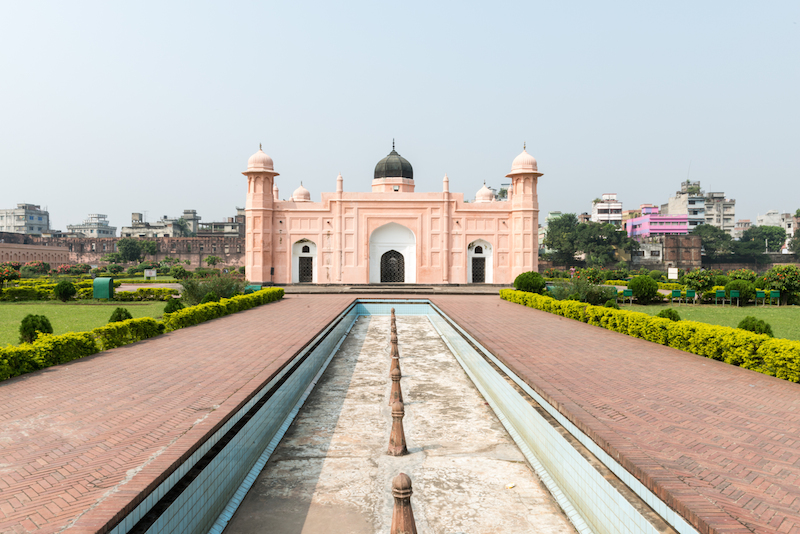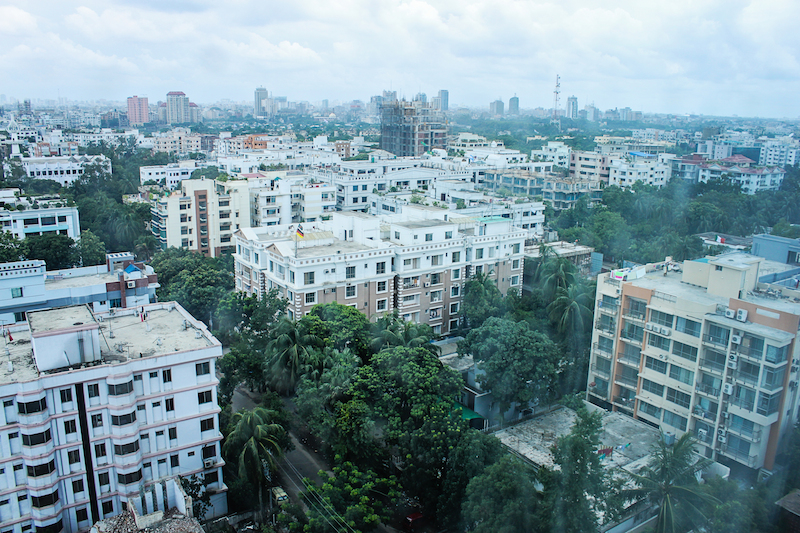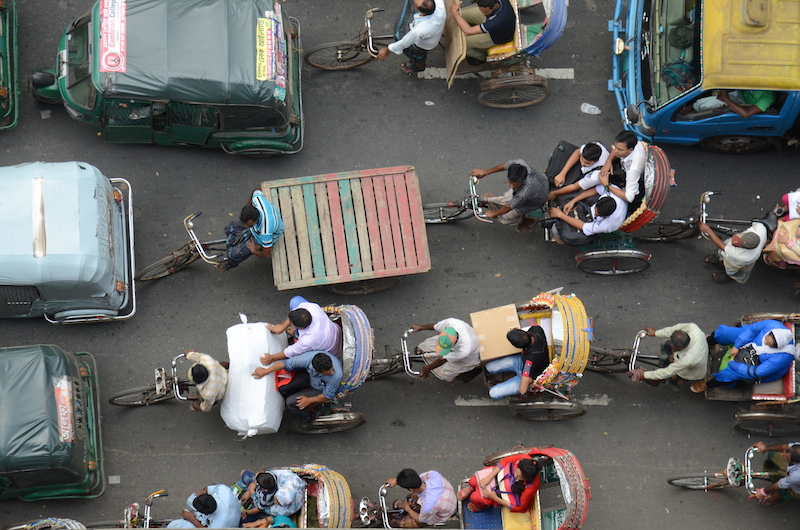Bangladesh is a very poor country. At first glance, it looks like a tiny country similar to India or Pakistan, which isn’t too far from the truth, really. There are some differences, though. You will feel the difference between people from India and people from Bangladesh the moment you get to the airport. Maybe it’s just my experience but on the flight to New Delhi, people were pushing and shoving to get to the gate. The flight to Dhaka was very different and people stood in an orderly line. On the plane, people from India spent the first 30 minutes just changing seats while Bangladeshi people sat in their seats and listened to everything the stewards and the captain told them.
I’d like to talk about the flight a little more. When I arrived at the check-in, my attention was promptly directed to a good price offer in case I wanted to move into the business class. My acquaintances, those who travel to and from Bangladesh, have told me that getting into the business class is easy during the flight and for free. All you need are nice clothes, a white face, and the courage to ask the stewardess if there’s a free space in business. I didn’t try it, even despite the fact that we didn’t get a blanket on the flight back. Apparently, they didn’t have any blankets at all available on that night flight to Abu Dhabi. I’m not interested in advantages just because I’m white.
I’ve flown to Asia several times, but the flight to Dhaka surprised me in a bad way because of the way one of the stewardesses behaved. Judging from her name, she may have been from the Ukraine. She kept rolling her eyes and even shoved several passengers with her elbows. She only ever smiled at me because I was the only one from Europe. You might ask how the people from Bangladesh handled the flight. They were quietly sitting in their seats. Some spoke with me and were incredibly nice.

The airport requires nerves of steel
The airport in Dhaka is very different from those in Europe or in the Emirates, so be ready. It’s absolute chaos over there. Your baggage may take over an hour to arrive and you’ll see baggage belts full of not only suitcases but also very odd things, such as belongings wrapped in bedsheets. The people of Bangladesh are patient, something we Europeans aren’t really known for. I remember a lady, either from Europe or the U.S., whose patience ran out and she took her anger out on the unfortunate man standing next to her. If you have transport waiting for you, don’t worry, they know what the airports are like and they won’t leave without you.
If you want to make sure everything is alright, you can ask someone from your flight to call them just in case. It’s possible that your transport won’t know English at all.
By the way, delayed flights are completely normal in Dhaka, too. Fortunately, my flights were on time but a friend of mine, who used to regularly fly to and from Dhaka, had a delay on almost every single flight.
You can get your travel visa at the airport
You can get your travel visa very easily at the airport. The man who gives out the visa told me that they accept all currencies, but he was pretty surprised when I wanted to pay with Serbian dinars. If you’re paying with dollars or euros, you won’t have any problems. Another man then asks you why are you visiting Bangladesh and how long you’re planning to stay. You have the right to a 30-day visa. I made a mistake of telling him the date of my return flight and so I only got a visa for two weeks. If I wanted to change my flight, I would be out of luck. Be sure to always say you’re visiting for a month, just so you get the full visa.

Money and paying in Bangladesh
The Bangladeshi currency is the taka. Make sure to check the currency exchange rates before you enter the country. The moment you arrive at the airport, people will expect money from you for even small services. For example, I got stuck in the bathroom and an elderly lady helped me. She then immediately stuck out her hand, expecting money. I gave her 100 taka, which is over 1 euro and asked her if it’s enough. She was very happy with that. Later I found out that, for example, a short ride in a bike rickshaw costs 20 taka.
As is common in Asia, people will see you as a rich tourist, so you have to look out for scammers trying to get some money out of you.. Don’t exchange all of your money at the airport, check a few exchange offices for a better price. It’s a bit easier to exchange dollars than euros, but exchange offices will accept both. Don’t depend on your bank card much.
The prices in Dhaka surprised me because I expected something similar to New Dehli. In India, I could eat for 2 euros while in Dhaka it was 10. Admittedly, I stayed in Gulshan, which is the most prominent and safest part of Dhaka, which probably contributed to the high prices. You can find most foreign embassies and ambassadors here.
Transportation in Dhaka
The subway in Dhaka is still being built, so you have to depend on other modes of transportation. The fastest way to travel short distances is to pay for a bike rickshaw. You can also use a motor rickshaw or a taxi. Try to avoid buses for your own safety, especially if you’re a woman. If you have the option, try to find out approximate rickshaw prices from your friends before you use one, so you don’t get scammed into paying too much just because you’re a tourist. Try to agree on a price before the ride itself.
Prepare for traffic jams and very polluted air. The only exception to this rule is the day of the elections when everyone has a mandatory day off and all cars, rickshaws, and other modes of transportation are prohibited. Taking a walk through Dhaka during election day is not advised because of your safety. I was in Dhaka during the elections and I can say that it was the best day for me. We could even see the blue sky, which you don’t normally get to see because of the pollution. When you’re reserving your plane ticket, make sure that there’s nothing happening in Dhaka on the day of your arrival. You wouldn’t want to get stuck at the airport because there’s no transportation. Only police, ambulances, and taxis from hotels are allowed on the roads during election day.

What about safety?
Many who travel to Bangladesh worry for their safety. It’s definitely justified when you’re traveling to the less advanced parts of the country, where tribal life is still common. Those people are very mistrustful and you can definitely get into a life-threatening situation. Even the Bangladeshi people risk a lot if they travel to those parts. If you’re planning to stay in Dhaka or visit Cox’s Bazar Beach, however, there’s not much to worry about.
Of course, being cautious is always a good idea and it’s also not advised to run around outside after dark. To be fair, though, there aren’t many places you can actually go at night. You won’t find any bars or parties here. Sometimes there are small events organized for tourists, but it’s very rare. Alcohol is prohibited in the country and you’ll only find it in very secluded spots that are there specifically for tourists. On the other hand, you can happily buy alcohol at the airport as you enter the country, just not inside the country itself.
Maybe I was just lucky, but the people I met were very nice. Overall, I felt I was safe even when I took a rickshaw alone after dark. I’ve met with a few foreigners who have lived in Dhaka for a long time and they didn’t complain about security overall. Only one friend had a negative experience – a rickshaw accident. She fell off and was unconscious for some time after.
When is a good time to visit?
Winter months – from November to February – are an ideal time to visit. It’s too hot from April until September and it also rains very often. Ideally, you should bring airy clothing with longer sleeves and legs. Bangladesh is a Muslim country and, although you don’t have to worry about any specific articles of clothing, it’s always good to not reveal your shoulders, legs or breasts much. Airy trousers are better than a skirt during the hot days anyway, because the sun won’t burn your skin.
Watch out for air conditioning! Yes, outside it’s so hot that you feel like you could start sweating blood at any moment, but inside it feels like a freezer. The Bangladeshi people don’t enjoy the heat either, so they usually turn their air conditioning up enough to rival arctic temperatures.
What about food?
I’ll be honest, I imagined Bangladesh to be similar to India when it comes to food. Great vegetable dishes, fruit I can buy on the street, and endless cheap markets and restaurants. Of course, you can find markets with exotic fruits in Dhaka, too, but the only thing I was able to buy directly on the street was a coconut. There is the odd cart with fruit and vegetables you can buy from, but they’re not very common.
As I’ve already mentioned, the prices of food in restaurants really surprised me. You can also find food outside, but that’s a bit of a risk. The best known ‘street food’ is the fuchka – vegetables with hot sauce in fried breading. This food is known as golgappa or panipuri in India. Vegetarians won’t be pleased because most of the Bangladeshi cuisine is based on meat. You can find some Indian or other Asian restaurants, though, which also serve vegetarian dishes.
Don’t drink tap water. You can easily get a large package of bottled water to drink. It’s also advised to wash your teeth with bottled water. I didn’t do that and I’m still here, but maybe I was just lucky.
Do you need any vaccination?
As is usually the case with Asian countries, it’s good to have the basics covered – Hepatitis A and B and typhoid. The rest is up to you. You can visit Bangladesh without any vaccination and still be alright but I can’t tell if it’s good to idea to risk it. Consult your doctor for more information, he will tell you more than I can.
Stay safe and enjoy your trip.